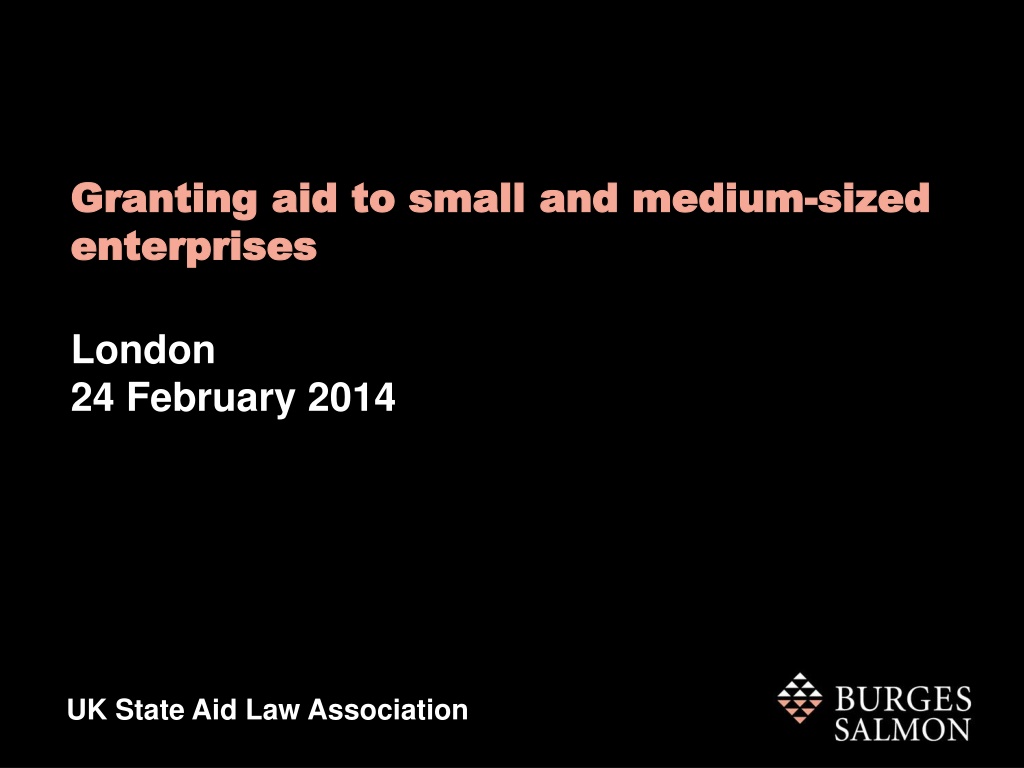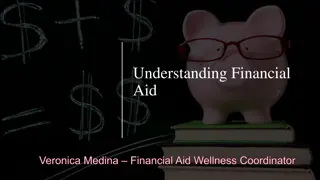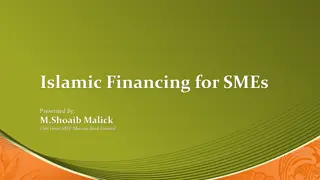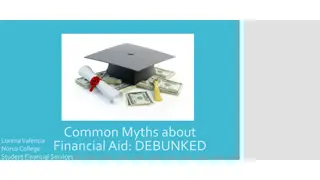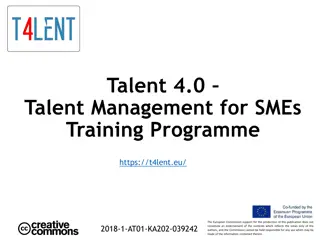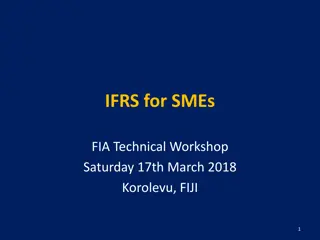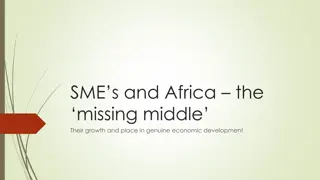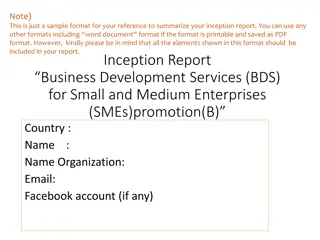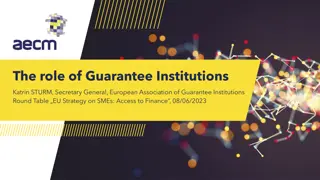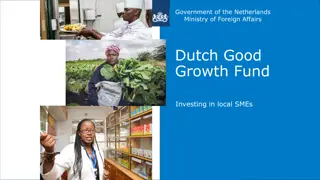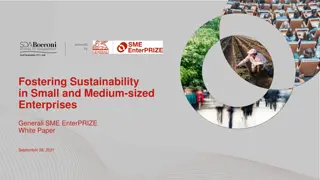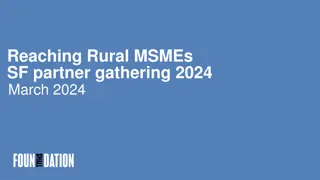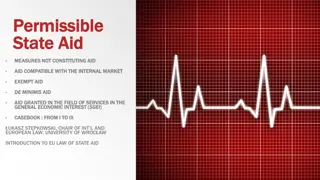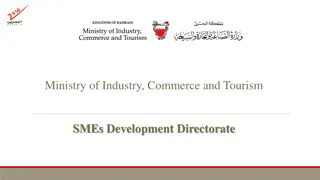Understanding State Aid Law for SMEs in London Event
Explore the key principles of granting state aid to small and medium-sized enterprises (SMEs) through insights shared by speakers at the London event in February 2014. Topics include the definition of aid, conditions for equity investment, impact on trade between Member States, and applicable tests for aid determination.
Download Presentation

Please find below an Image/Link to download the presentation.
The content on the website is provided AS IS for your information and personal use only. It may not be sold, licensed, or shared on other websites without obtaining consent from the author. Download presentation by click this link. If you encounter any issues during the download, it is possible that the publisher has removed the file from their server.
E N D
Presentation Transcript
Granting aid to small and medium Granting aid to small and medium- -sized enterprises enterprises sized London 24 February 2014 UK State Aid Law Association
Speakers Joseph Barrett 11 King s Bench Walk Alan Bates Monckton Chambers Nicholas Wright Assistant Director, State Aid Policy Department for Business, Innovation & Skills UKSALA Aid to SMEs
Granting State aid to SMEs basic principles Joseph Barrett February 2014 3 3
1. If there is no advantage, there is no aid - Loans at market rates - Equity investment consistent with market economy investor principle (in particular if investment is pari passu with private sector) 11kbw.com 11kbw.com 4 4
1. If there is no advantage, there is no aid (continued) - Steps to ensure equity investment does not confer advantage: - Same level of risk/return as private investor - Private investor provides at least 50% total - Public and private investments subject to same degree of subordination 11kbw.com 11kbw.com 5 5
2. If a measure does not affect trade between M/S , there is no aid (1) The test is not the same as that which applies to free movement of goods, services etc. (2) No need to show concrete effect on any cross- border economic activity 11kbw.com 11kbw.com 6 6
2. If a measure does not affect trade between M/S , there is no aid (continued) (3) Case C-280/00 Altmark Trans [2003] ECR I-7747 at 77-79 (local bus routes): sufficient if strengthens undertaking where cross-border entities might conceivably seek to compete in future where State financial aid strengthens the position of an undertaking as compared with other undertakings competing in intra-Community trade, the latter must be regarded as affected by the aid 11kbw.com 11kbw.com 7 7
2. If a measure does not affect trade between M/S , there is no aid (continued) (4) But, in a number of contexts Commission has accepted no affect on trade: - leisure facilities predominantly local catchment area: N 258/2000 Leisure Pool Dorsten - Local museums/cultural infrastructure: SA.34466 Cyprus Center for Visual Arts and Research - Local hospitals/healthcare facilities: SA.34576 Portugal Jean Piaget North-east Continuing Care Unit - news media and/or cultural products with locally restricted audience (e.g. minority language etc.): SA.33243 Jornal de Madeira - a conference centre, where the location and the potential effect of the aid on prices is unlikely to divert users from other centres in other M/S: N 486/2002 Sweden Congress Hall in Visby 11kbw.com 11kbw.com 8 8
2. If a measure does not affect trade between M/S , there is no aid (continued) - The Commission s practice often lacks coherence. A holistic assessment required: (1) Value of measure (2) Nature of recipient (3) Sector in which recipient acts (consider Annex XIV of new Public Contracts Directive) 11kbw.com 11kbw.com 9 9
2. If a measure does not affect trade between M/S , there is no aid (continued) (4) Geographic location of recipient (5) Recipient s corporate group (6) Identity of any service users etc. - Not straightforward, but (with care) can be done. 11kbw.com 11kbw.com 10 10
3. De minimis Regulation 2014-2020 - Commission Regulation 1407/2013 (24.12.13) - Maximum EUR 200,000 over three years to a single undertaking - Maximum is cumulative with other aid - Measure must be transparent (i.e. possible precisely to calculate the gross grant equivalent) - Before grant, must: (i) inform recipient gross grant equivalent, (ii) refer to the Regulation, and (iii) obtain declaration from undertaking re. any other aid under the Regulation in the current and previous two fiscal years 11kbw.com 11kbw.com 11 11
3. De minimis Regulation (continued) - Commission rejected raising the EUR 200,000 threshold (M/S lobbied for EUR 300,000 - 500,000) - Impact assessment asserts that: competition and trade can be distorted by the aggregate effects of de minimis aid in sectors with many smaller undertakings 11kbw.com 11kbw.com 12 12
4. General Block Exemption Regulation - New GBER comes into force on 1 July 2014 - Most recent draft 18.12.2013 - Consultation now closed 11kbw.com 11kbw.com 13 13
4. General Block Exemption Regulation (continued) (1) Definition adopted from Recommendation 2003/361/EC re. definition of micro, small and medium sized enterprises (2) Recital 40: SMEs play a decisive role in job creation and, more generally, act as a factor of social stability and economic development To facilitate the development of the economic activities of SMEs, this Regulation should therefore exempt certain categories of aid when they are granted in favour of SMEs. These categories should include, in particular SME investment aid and SME participation in fairs 11kbw.com 11kbw.com 14 14
4. General Block Exemption Regulation (continued) (3) Recital 43: risk finance measures which seek to attract private capital for risk finance provision to unlisted SMEs affected by the funding gap and which ensure profit-driven financing decisions and commercial management of financial intermediaries should be exempt from the notification requirement under certain conditions. 11kbw.com 11kbw.com 15 15
4. General Block Exemption (continued) (4) Recital 46: Aid for research, development and innovation is of particular importance for SMEs Aid for research and development projects, aid for feasibility studies, as well as innovation aid for SMEs, including aid to cover industrial property rights costs for SMEs should therefore be exempt from the requirement of notification under certain conditions. 11kbw.com 11kbw.com 16 16
4. General Block Exemption Regulation (continued) - Art 1(b): aid to SMEs in the form of investment aid, operating aid and SMEs' access to finance - Article 4 (principal SME notification thresholds) - SME investment aid: EUR 7.5 million per undertaking per investment project aid for SME participation in fairs: EUR 2 million per undertaking, per project aid for SMEs' cooperation costs linked to ETC projects: EUR 2 million per undertaking, per project innovation aid for SMEs: EUR [5] million per undertaking, per project - - - 11kbw.com 11kbw.com 17 17
4. General Block Exemption Regulation (continued) - Section 2 Aid for SMEs - - - Art. 17 SME Investment aid Art. 18 SME participation in fairs Art. 19 SME co-op in Euro Territorial Cooperation projects - Section 3 Aid for access to finance for SMEs - - - Art. 20 Risk finance aid Art. 21 Aid for start-ups Art. 22 Aid to alternative trading platforms specialising in SMEs Art. 23 Aid for scouting costs - 11kbw.com 11kbw.com 18 18
4. General Block Exemption Regulation (continued) - Also favourable treatment under other heads, e.g. regional aid and training and development - Note also new Guidelines on State aid to promote risk finance investments (2014/C 19/04) (22.1.2014) 11kbw.com 11kbw.com 19 19
11KBW is renowned for the outstanding quality of its advice, advocacy and client service. Our barristers are experts in Public, Commercial and Employment Law and lead the field in a number of specialist areas. barristers of the very highest quality Legal 500 Please get in touch with our team to discuss what you need: Joint Senior Clerks Lucy Barbet & Mark Dann Director of Business Development Andrea Kennedy Operations Manager Claire Halas Tel: +44 (0) 20 7632 8500 Email: clerksteam@11kbw.com Address: 11 King s Bench Walk, London EC4Y 7EQ Web: www.11kbw.com 20 20
The Very Small and the Very Friendly: Start-ups, Spin-outs and Mutuals Interesting (and tricky?) practical issues Presentation for UK State Aid Law Association and Burges Salmon seminar, 24 February 2014 Alan Bates Barrister abates@monckton.com 21 21
Issues covered in this presentation (1) Is State Aid being provided? The boundaries of non-economic activity : Services provided at a loss Introduction of market mechanisms in public services Multi-function premises Can aids provided at the pre-undertaking stage be caught by Article 107(1)? Can MEIP apply to the State as a buyer? Spin-outs and pension liabilities Transfers of public assets: Reducing land values through constraints on use Purely local interest and land leases 22 22
Issues covered in this presentation (2) Supports distributed by autonomous bodies Tax concessions for co-ops and charities Bases for exemption SGEI regime: The Credit Unions decision Ongoing monitoring under the PSC Decision The new GBER: Start-ups Access to finance for SMEs Innovation clusters 23 23
The boundaries of non-economic activity Services provided at a loss Does the fact that a non- State entity is making a charge for a service mean that it is carrying out economic activity ? Commission Communication on SGEI at para 27: [T]he non-economic nature of public education is in principle not affected by the fact that pupils or their parents sometimes have to pay tuition or enrolment fees which contribute to the operating expenses of the system. Such financial contributions often only cover a fraction of the true costs of the service and can thus not be considered as remuneration for the service provided. They therefore do not alter the non-economic nature of a general education service predominantly funded by the public purse. Introduction of market mechanisms in public services Multi-function premises (e.g. new FE colleges) 24 24
Can aids provided at the pre-undertaking stage be caught by Article 107(1)? Common for State to provide assistance to individuals to assist them in potentially setting up an undertaking If no undertaking ever formed, then cannot be State Aid When is an undertaking formed? Economic unit Common intention to trade business plan Common IP or other assets If an undertaking is formed, can supports provided at the pre-undertaking stage become State Aid? Suggested view: Yes, if relieves the new undertaking of costs it would otherwise have had to bear But general advice to individuals about externalisation not caught 25 25
Can MEIP apply to the State as a buyer? State may wish to foster the creation of new entities (spin-outs, mutuals, etc.) in order to be able to purchase within a more diverse market Basic principle is that, for the purposes of MEIP analysis, one cannot attribute to the hypothetical commercially-motivated private investor any features or considerations that are relevant to the State by virtue of its position as a public authority But State is carrying out an essentially commercial activity when it is purchasing goods or services in competitive markets Private sector entities may be prepared to encourage, or even sponsor, new market entry into markets in which they are purchasers 26 26
Spin-outs and pension liabilities To what extent are accrued pension liabilities costs that the spun-out entity would normally have to bear? In principle, the State should bear pension liabilities relating to the period when the employees were employed by the State State could purchase a pension bond or provide a guarantee Insofar as the bond / guarantee relates to periods for which the employees are employed by the new entity, the new entity should have to make a payment to the State for the provision of the bond / guarantee 27 27
Transfers of public assets Reducing land values through constraints on use: Cannot be linked to transferee s own intended use (see Commission Communication on land sales by public authorities) But some restrictions may relate to genuine underlying requirements as to how the land can be used Purely local interest : Can it apply to services provided in markets in which there is a significant element of cross-border trade (e.g. transport services) ? If so, then can the letting of small units (e.g. work units for craftsmen; meeting rooms; performance spaces) in a specific geographical location be regarded as being of purely local interest and therefore not capable of affecting cross-border trade? 28 28
Supports provided by autonomous bodies whose funding originates from the State UK has chains of organisations between State and ultimate beneficiaries Stardust Marine - State must actually exercise a dominant influence of the body s operations but this can be inferred from various factors, e.g. integration into public administration structures, intensity of supervision by the State Air France: The Caisse enjoyed legal autonomy from the State and was able to take independent investment decisions, but its tasks were governed by statutory and regulatory rules and its directors were appointed by the State, so belong[ed] to the public sector But Stardust Marine reasoning suggests a broad anti- avoidance rule catching bodies formed for the purpose of distributing State resources for economic or social purposes 29 29
Tax concessions for co-ops and charities Draft Commission Notice on the Notion of Aid (Jan 2014) 5.4.1: Says that in the light of the peculiarities of co-operative societies, they are not in a comparable situation to commercial companies, and so preferential tax treatment may fall outside the scope of the State Aid rules provided that certain conditions are satisfied (e.g. they act in the interests of members, members are involved in running the business, and members share the profits) If these conditions not satisfied, then logic of the system can still be relied on Seems unprincipled - but may be helpful to charities, community interest companies, etc. Relevant to charities advantages, e.g. 80% business rates relief 30 30
The SGEI regime ECJ s reasoning in BUPA (paras 185-190) does not mean that the service has to be available to all comers on the same basis (the ECJ was simply relying on the fact that, in the case before it, the service had to be made available to all comers as demonstrating the existence of a public service obligation) Market failure : see Credit Unions decision (SA Case N244/2003), point 64 - financially excluded people When using the PSC Decision, can over-compensation be avoided by requiring all aid and revenues to be used up on the entrusted activities? Should the UK Government establish a central body to fulfil the ongoing monitoring requirement? 31 31
The new GBER (1) Start-ups: Much more generous than current regime Small unlisted enterprises up to 5 years old Art.21(3)(c) refers to grants including equity and quasi-equity investment of up to 400,000 GGE (or 800,000 in the case of small innovative enterprises) Access to finance for SMEs: Very low proportion of private investment (10%) required prior to first commercial sale, and only 40% for under 7 years old Financial intermediaries, investors and fund managers to be selected through open call, but no specific requirement for pari passu investment 32 32
The new GBER (2) Innovation aid for SMEs: In some respects, less generous regime for innovation advisory services - only 50% of eligible costs, but no 200,000 limit Innovation clusters: Aid must be granted exclusively to the legal entity operating the innovation cluster (cluster organisation) The fees charged for using the cluster s facilities and for participating in its activities shall correspond to the market price or reflect their costs Not clear if reflects their costs means costs after reduction by the aid UK likely to continue relying on a pass through analysis based on the German incubators case 33 33
Thank you for listening Alan Bates abates@monckton.com 34 34
UKSALA Aid to SMEs over the information, you should not rely on it as legal advice. We do not accept any liability to anyone who does rely on its content. This presentation gives general information only and is not intended to be an exhaustive statement of the law. Although we have taken care
